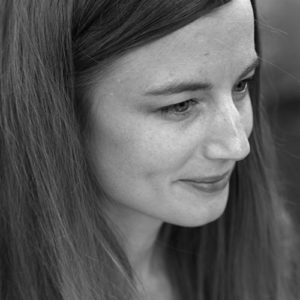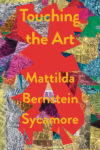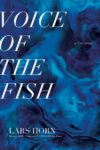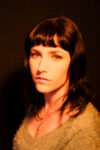 Hilary Plum, author of They Dragged Them Through the Streets (FC2, 2013) began Watchfires a month after this first novel was published, and when her husband (the poet Zach Savich) first had cancer. As the book documents, the week of his cancer surgery was the week of the Boston Marathon bombings—their happening and the resultant search for the Tsarnaev brothers. Watchfires looks further inward to Hilary’s own life—a long illness she suffered through her twenties—as it considers how terrorism is compared to cancer, and the war on terror as autoimmune disease. And it pays special attention to these brothers who perpetrated the bombings; as Watchfires makes uncomfortably plain, the Chechen brothers—who practiced Islam, emigrated to the U.S. in 2002, one of whom was a student of marine biology at UMass—cannot easily be sorted into an “us” or “them.” Nor can this book be sorted out as memoir and/or political commentary, as it takes politics, and the commands of citizenry, up into the daily vulnerability of a life-so-far of someone who is sometimes sick, sometimes married, sometimes writing (sometimes these sometimes crackling and colluding). Sickness makes you myopic; pain zooms you right in. Watchfires becomes a work about where the political still crackles, colludes in all experience, even the privacy, or isolation, of illness.
Hilary Plum, author of They Dragged Them Through the Streets (FC2, 2013) began Watchfires a month after this first novel was published, and when her husband (the poet Zach Savich) first had cancer. As the book documents, the week of his cancer surgery was the week of the Boston Marathon bombings—their happening and the resultant search for the Tsarnaev brothers. Watchfires looks further inward to Hilary’s own life—a long illness she suffered through her twenties—as it considers how terrorism is compared to cancer, and the war on terror as autoimmune disease. And it pays special attention to these brothers who perpetrated the bombings; as Watchfires makes uncomfortably plain, the Chechen brothers—who practiced Islam, emigrated to the U.S. in 2002, one of whom was a student of marine biology at UMass—cannot easily be sorted into an “us” or “them.” Nor can this book be sorted out as memoir and/or political commentary, as it takes politics, and the commands of citizenry, up into the daily vulnerability of a life-so-far of someone who is sometimes sick, sometimes married, sometimes writing (sometimes these sometimes crackling and colluding). Sickness makes you myopic; pain zooms you right in. Watchfires becomes a work about where the political still crackles, colludes in all experience, even the privacy, or isolation, of illness.
It is worth noting that Zach’s memoir about cancer, friendship, poetry and teaching, Diving Makes the Water Deep, was published concurrently, this past November, with Watchfires. It was reviewed in these pages earlier this week.
In it he writes: “Before a friend’s wedding, Brooklyn. My wife and I have a drink at a rosy bar, on a narrow bench out front, backs against stained glass, iron railing pressing our knees. Exhausted from travel into the city, though I can’t tell you how we got there—bus? train? from where? But I know we were there and for several minutes I understood we were minor figures in a painting, features smudged. The painting of our lives would stay on a gallery wall long after we had faded, and the bicycles passing had, and the herbs in my cocktail that must have been in fashion, whatever century this was.”
I interviewed Hilary in November/December of 2016. I read her new book this past September, mistakenly in public. I wrote in my journal a few things, one: “These two people whom I love. Who in many ways make my life. Hold it up for me to touch.” If I am good, and connective, I will say you could touch at your life if you held onto either book, both—but I don’t want to connect a concept. I want to say: I love.
Caren Beilin: Your work of nonfiction, Watchfires, is published synchronously with Zach Savich’s Diving Makes the Water Deep. He’s your husband; the books are different. But the books each touch your relationship.
Hilary Plum: It is lovely, in a personal way, that the books stepped together into the world, and it has felt right and lucky that this is the work of Caryl Pagel, one of independent literature’s great publishers (at Rescue Press and the Cleveland State University Poetry Center). Yet I want these books to thrive independently, too, and I suppose the reason I’ve been dawdling all weekend to respond to your question is that this creative synchronicity and independence has something to do with marriage—but what?
I could say that of course all books are acts of collaboration, and I wouldn’t have written Watchfires if I hadn’t handed Zach a scrap of it in May 2013: generously he said it was not a scrap but a book, so I wrote the book. I could say something of the long hospital days we’ve been in and how, though I may feel some skepticism for the institution of marriage, it is so useful, if you are in a hospital bed, to have a buddy, let’s say, to have one person daily at your side. I don’t quite like writing that; it is true yet seems to obscure the presence of all the others, real and urgently imagined, who are with us, too. Marriage is a vitally collective endeavor, yet of course it can also be a means to suppress other ways to imagine and live collectively. Marriage bears so much of the burden of our interdependence; it can and can’t take the strain. (I have been married, for example, twice.) Here in my mid-thirties most people I know are married, by some definition, or flirting with the idea: it’s practical; it is distinctly beautiful. And yet. One feels fulfillment in and friction with the form; one knows oneself as formed. To comprehend this is work, I hope, that writing may do.
With you and Zach, these books co-stamp the surface, but also Watchfires covers times when Zach is sick and when you are, like taking turns (maybe not so neatly). I wanted to ask you about how you write about illness, yours or his. I’m thinking of some lines from the artist Carolyn Lazard in her essay “How to Be a Person in the Age of Autoimmunity”: “The chronically ill are often cast as victims of fate or genetics. Rarely are we politicized or allowed to relate our personal experiences to larger social or cultural phenomena.” You do this. You map the experiences of your body (the diagnostic concepts and categories that trail it, track it, I would say attempt to smack onto it) onto contemporary, international, inter-national war. “Metaphorically speaking, are we now in the age of autoimmune disease?” you write, “Now the enemy is ourselves: we can no longer tell friend from foe; we mistake self for other. Helpless we mount full-force attacks against ourselves.” Did this feel daring, like something you’re not supposed to do with illness? It feels anti-memoir. Certainly anti-medicine. Maybe that is sufficient or I will ask, did you write this against something, what?
The obvious but necessary criticism of many memoirs on illness is that they look for redemption. They shape themselves into a redemptive arc. They want to or can’t help but insist that suffering will be redeemed as salvation. In different ways both Zach’s book and mine resist this arc. In my case, a story of redemption might be easier to tell, since the illness I was writing of has improved. But I still think that many narrative structures would dishonor the experience of prolonged, paralyzed time that long illness is. So I wanted a structure that could consider the experience and ethics of that sick time—trapped on a couch before a screen, world’s helpless observer—and could comprehend whatever healing occurred in nonredemptive terms. I wanted a way to write that didn’t rewrite past suffering, as means to some end, but let me see it more clearly.
Maybe, despite myself, this kind of seeing is a use to which illness may be put. Watchfires tries to let private and public experiences illuminate one another—to comprehend the diseases I’ve known within the context of a political world structured by metaphors of disease. The book considers how terrorism is compared to cancer, then considers the so-called war on terror as autoimmunity. As in the quotation you include above.
And maybe, then, to extend from that quotation, the way to approach memoir is not to mistake self for self: to know oneself as made up of and responsible to others, in political or intimate or changing terms. I never thought that I would write “memoir,” since I’d always been a private person. As I grow older I grow more open because I think that to offer oneself as a subject for consideration may be an act of generosity. A way to make meaning with one another, a foregrounding of the self that abandons claims to the self, a freedom, extended. I hope? Maybe there’s redemption in that, but if there is, I really don’t know how to name it and can’t call it mine.
I went through a thing of fuck-the-self and there’s no way I’m writing a memoir because there is nothing in here. But then last year I began writing this massive piece of empathy-fiction, like all about writing into the space of The Other, etc., and I kept going because I had promised (proposed) an institution I’d do this, and in my proposal I had glorified Empathy Fiction as a means for world peace—but then, as I was writing it, I felt colonial. It felt like a pathetic breach and that instead I wanted to give in my writing only an offer of privacy, to only behold the opacity in things, and of others. But how do you do this? I started writing very tightly about myself as a mercy unto others—I will not leach into you with my imagination, my sick ambition, with the flex of my heaps of time + space: with sick craft. I think writing a memoir became a way to have manners, for me. But then, can you talk about your use of pronouns in this memoir and also, the places where you leap out of the understood space of “memoir” and into something else that is surreal and ecstatic and broken—what I mean is, about 3/4s of the way through, you kind of break your own book. It made me cry I was so happy you did it! What was this gesture all about for you?
I’d tried for years to write something about illness, time and illness, sick time, but I tended to hate the results. When I tried again in 2013, I started in the third person, so that in Watchfires I am she. This opened a door. That’s not just some craft trick (though it works as one, I guess): the problem of I and she is the problem of illness, the sick self. My illness was/is neurological and episodic: when sick I couldn’t write, couldn’t do much of anything. So on the days when I was well and I sat at the desk to write about illness, it was always the wrong person writing. The sick self couldn’t speak, so I was speaking for her. It’s not enough to remember illness, because as soon as you’ve returned to greater ability, the confining reality—the relentless limitation—of illness recedes; the experience of illness becomes more imagined than known. “She” allowed me to look at that problem and to make it a subject of the essay.
I call the book an essay even though, as you say, it leaves strict memoir behind and lets fiction in. I’ll try not to say too much about this—not that it’s some spoiler, but I don’t want to interfere too much with how anyone might read. But three-quarters of the way in, an “I” enters, and the first-person gets more fictional than the third-person has been (a reversal of the most basic conventional structure, in which memoir would require “I” and the omniscient third-person would be the stuff of fiction). I wanted the book to tender its own process. An endeavor in common, I think, with some of the work that’s today called autotheory, and with the work we publish in Rescue Press’s Open Prose Series, which often can’t be named finally by genre. Watchfires emphasizes process by taking place nearly entirely in the time of its initial writing, April to August-ish 2013. But further, I wanted the book to have to think about why we turn to x form or y, essay or novel, how we choose, and I could do this by performing very publicly a pivot. This is a kind of breaking, as you say, though I was thinking of it as a, like, volta. It wasn’t necessary—and that second section gave me a lot of trouble—but it was a little violent in a way that I thought might get somewhere.
Watchfires circles the figure of Dzhokhar Tsarnaev, the younger of the two brothers who perpetrated the Boston Marathon bombing, presently awaiting execution. The “I” allowed me both to get closer to him and to better map my distance from him. The “I” in the book gets involved in his case as a reporter or sleuth might, and this let me step into the form of detective fiction that the book also considers—through long years of illness the one thing I reliably did was read book after book of detective fiction. Writing myself as a sleuth, then, was a way to enter the imagination of my sick self, get closer to her again, maybe. And like any sleuth, the closer I came to the heart of the crime—those bombings—the greater their mystery, and the more implicated I was in it. The second section envisions Tsarnaev more intimately yet more imaginatively, more intimately because more imaginatively, not intimately at all because it’s all just imagined. I can’t know him; we can’t; there is no one narrative that resolves the meaning of the violence he committed, its origins, its effects, how we locate ourselves in its story, how he locates us in his.
Yes, and because I want to be a good student, I want to be your good student, I will brightly make the correlative match that illness is such [exhausting] detective work. You go snooping and sniffing and hunting in the body—in what, a penumbric submarine?—looking for clues, and true to good detective fiction, you found the cause of your own illness in the marginalia, the maid’s boyfriend did it, the accountant’s accountant—something obscure that was actually right before your nose. But this is not really a book about getting better; I’d say it’s about going on. I think about that now because these times feel dark. The rupture. Is writing still a way to go on?
It is hard to speak from this moment, which seems to be both after and before rupture. Every day (every hour?) to read the news is—more so than ever—to feel the ground we’ve all built on, the ground where we live together, shudder. Where will the cracks first open? How swiftly can we move? What may our movement look like? Like many people I feel futility, profound defeat, but clarity. One looks at the world Trump is building and sees clearly how fucking blind it is. The steady, daily, compassionate work of the many people one knows has always been building something else and will persist and persist. I don’t say that to be naïve; no one needs me to point out how brutal, unthinkable, the consequences of his destruction might be.
If we want examples of times and places where cynicism has reigned, where people persist and persist in the ongoing wake of exploitation and greed and racism and destruction, there are places to look, but we may have to finally see ourselves there. We may have to look at what our country was willing to do, for example, in Iraq.
The work of speaking—of writing—is long work, at least for me. It is exactly the work of going on. Writing isn’t distinct from living; writing isn’t about, it is. In a poetry class I substitute-taught last week students reflected on how the word political has changed for them in the past few months; they meant that this happened through poetry. This past year I have been rereading the three translations into English of Mahmoud Darwish’s long poem Mural (by Munir Akash and Carolyn Forché; by Fady Joudah; by Rema Hammami and John Berger). I think I chose this task because it could never conclude; this way the poem and I could live through one another.
To consider your “still” (“Is writing still a way to go on?”), I could think of books that arrived just this year and whose work is still beginning. Hayan Charara’s great new collection Something Sinister: I can imagine the years it must have taken to offer this book—an act of hope, even if we need his work especially now because of our accelerating danger. Even to read that book (which I reviewed, with thanks to Poetry Northwest) drew upon, of course, years of my own life: this is the honor of reading. Or, Eric Fair’s wrenching Consequence, which relates with rare honesty his time working as an interrogator and perpetrating torture in Iraq. The book centers on an invocation from Maimonides: “a person is not forgiven until he pays back his fellow man what he owes him and appeases him. He must placate him and approach him again and again until he is forgiven.” The labor of this again and again, which may never conclude; the going on. Or, Don Mee Choi’s commanding Hardly War. Or, too, Zach’s The Orchard Green and Every Color, which has much to say of fragility and the endurances of desire. It is true that probably none of these, like so many other books, will reach as wide an audience as needs them, as could be changed by receiving them; this is a difficult fact of literature’s place in the culture right now. But that’s a difficulty, not a defeat; the work goes on, and now we have to do it.
Caren Beilin is the author of a novel, The University of Pennsylvania, and some short fictions, Americans, Guests, or Us. She lives in Philadelphia.
This post may contain affiliate links.







